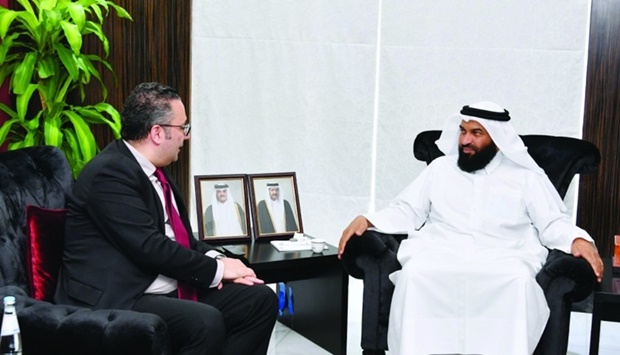Qatar Chamber board member Dr Mohamed Jawhar al-Mohamed met Wednesday with Dr Volkan Recai, representative of the Standing Committee for Economic and Commercial Co-operation of the Organisation of the Islamic Co-operation (COMCEC).
The meeting comes as part of the study visit held by the delegation to examine the development of the transport sector in Qatar and learn about the main projects implemented to develop the sector, in addition to obstacles facing the industry and ways to solve them.
It touched on an overall view of the Qatari transport sector and the most important projects developed by the state, in addition to a survey of the chamber's views on the importance of these projects in enhancing the investment climate in the country.
Dr al-Mohamed stressed the state’s interest in developing the transport and logistics sector by offering a sophisticated infrastructure and developing a network of roads, in addition to Qatar Rail projects, among others, noting that the transport sector has witnessed great development during the past few years.
He also underscored the active contribution of the private sector to the development of many projects, especially the partnership with the public sector, noting that PPP has proven its high efficiency in many projects in various sectors.
Dr Recai said COMCEC selected two countries for the study – Qatar and Uganda, pointing out that choosing Qatar was due to the considerable development it had achieved in the transport sector and its importance in promoting the country's economic growth.
COMCEC was established in 1981 and currently has 57 member countries, as well as five observer countries spread over four continents. Its main objective is to address the economic challenges of OIC countries and to contribute to the development efforts of the member states.
It aims to produce and disseminate knowledge, share experience and best practices, develop a common understanding, and approximate policies among member states in line with the vision and principles of the strategy.
It also works to study all possible means of strengthening economic and commercial cooperation among member states and ensure the overall coordination of the activities of the OIC relating to economic and commercial co-operation among the member states.
COMCEC convenes annually at a ministerial level in Istanbul, Turkiye under the chairmanship of the president of the Republic of Turkiye. So far it has regularly convened 37 sessions.
The meeting comes as part of the study visit held by the delegation to examine the development of the transport sector in Qatar and learn about the main projects implemented to develop the sector, in addition to obstacles facing the industry and ways to solve them.
It touched on an overall view of the Qatari transport sector and the most important projects developed by the state, in addition to a survey of the chamber's views on the importance of these projects in enhancing the investment climate in the country.
Dr al-Mohamed stressed the state’s interest in developing the transport and logistics sector by offering a sophisticated infrastructure and developing a network of roads, in addition to Qatar Rail projects, among others, noting that the transport sector has witnessed great development during the past few years.
He also underscored the active contribution of the private sector to the development of many projects, especially the partnership with the public sector, noting that PPP has proven its high efficiency in many projects in various sectors.
Dr Recai said COMCEC selected two countries for the study – Qatar and Uganda, pointing out that choosing Qatar was due to the considerable development it had achieved in the transport sector and its importance in promoting the country's economic growth.
COMCEC was established in 1981 and currently has 57 member countries, as well as five observer countries spread over four continents. Its main objective is to address the economic challenges of OIC countries and to contribute to the development efforts of the member states.
It aims to produce and disseminate knowledge, share experience and best practices, develop a common understanding, and approximate policies among member states in line with the vision and principles of the strategy.
It also works to study all possible means of strengthening economic and commercial cooperation among member states and ensure the overall coordination of the activities of the OIC relating to economic and commercial co-operation among the member states.
COMCEC convenes annually at a ministerial level in Istanbul, Turkiye under the chairmanship of the president of the Republic of Turkiye. So far it has regularly convened 37 sessions.

